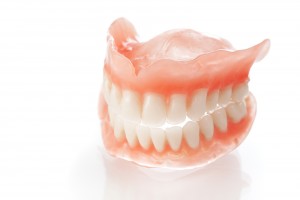Dentures Loganville, GA

What Are Dentures?
Dentures are a removable replacement option for any missing teeth and surrounding tissues. There are two types of dentures available for treatment methods- complete and partial dentures. When all teeth are missing, a complete denture is used to restore the lost teeth. While a complete set of dentures replaces all missing teeth, partial dentures are used when only some of your natural teeth remain in place.
Complete Dentures:
Like mentioned above, complete dentures are used to restore all missing teeth and come in two forms- conventional and immediate dentures. Conventional dentures are made after all teeth have been extracted and the gum tissue has began the healing stage. They are ready for placement in the mouth after about 8 to 12 weeks after teeth have been removed to allow your gums to properly heal.
Immediate dentures are made in advance and are positioned as soon as the teeth are extracted. A major benefit to selecting immediate dentures is that the patient does not have to go without teeth while the gums heal. The downside to having immediate dentures is that bones and gums shrink over time as they go through the healing phase. This becomes a disadvantage, compared to conventional dentures, because they will require additional adjustments to ensure a proper fit during the healing process. With that being said, we always recommend that immediate dentures should only be considered a temporary solution, until the conventional dentures are made.
Partial Dentures:
Partial dentures are recommended for use when one or more of your natural teeth still remain in the upper or lower jaw areas. They are removable and usually consist of replacement teeth. They come attached to a pink (gum colored) plastic base, which is then connected to metal framework to hold the denture in place while in the mouth. For a more natural look, a precision partial denture may be used. This type of denture is removable, but has internal attachments, rather than metal clasps, that attach to adjacent crowns.
Partial dentures also come as a fixed, or permanent, bridge that replaces one or more teeth with dental crowns that are then finished with artificial teeth. The bridge is then cemented into place providing a more durable foundation. One of the many benefits to selecting partial dentures is that they help to fill spaces and gaps, while keeping the surrounding teeth from shifting and changing positions.
Are There Alternatives To Dentures?
Yes, another option, rather than dentures, are dental implants. Dental implants are used to help support permanently cemented bridges, which eliminates the need for dentures. The cost of dental implants are usually greater compared to dentures, but implants and bridges give you more of a natural look due to closely resembling real teeth. Though they are an alternative option, not everyone is a candidate for implants. Consult with Dr. E during your consultation about which treatment method is best for you and additional dental advice.
After Care For Your New Dentures:
After care is very important when it comes to your new dentures. In addition to preserving them for long lasting results, there are also a few things you will need to be patient with as you are adjusting to them. Review the following for help:
- Comfort– your new dentures may feel a little odd or loose at first. This is because your muscles in your cheeks and your tongue have to learn to keep them in place until you get used to inserting and removing them.
- Eating– When you first eat with new dentures, it will take a little practice and a little time for you to get used to them. Start off with soft foods and cut them into smaller pieces for easy chewing. Make sure you chew slowly and with both sides of your mouth. You can add in additional foods from your diet as your become more accustomed to them.
- Speaking– At first, you may find that you may have difficulty pronouncing certain words or phrases. If so, practice saying the difficult words over and over again, out loud. With a little practice, you should have it down in no time!
Additional after care and cleaning recommendations will be covered by Dr. E after you have received your new dentures. If you ever have any questions regarding care or initial treatment, please do not hesitate to contact us or schedule your next dental exam with us online.



